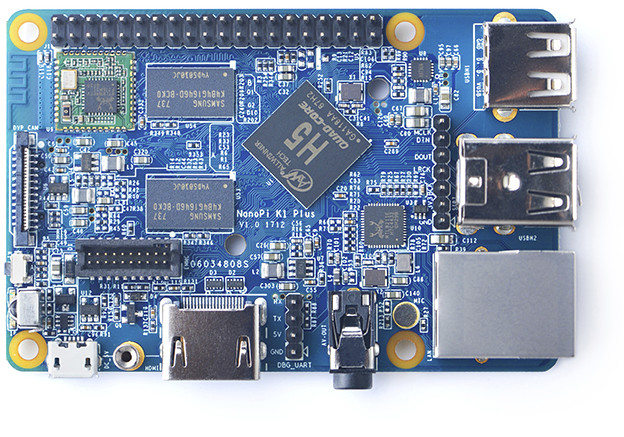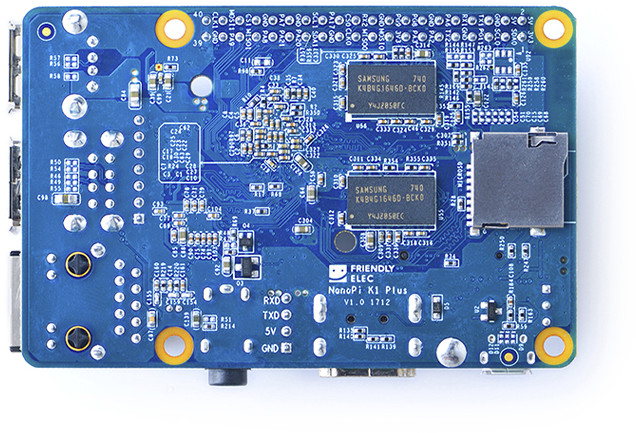Almost exactly one year ago, FriendlyELEC launched NanoPi K2 board powered by Amlogic S905 processor, following Raspberry Pi 3 form factor, but adding an eMMC flash socket, Gigabit Ethernet, 4K video playback, an I2S header, more memory (2GB RAM), and doing without a camera or LCD display interface.
The company has now launched another similar looking model – NanoPi K1 Plus – based on Allwinner H5 processor, also equipped with one DVP camera connector, but losing one USB 2.0 port, and HDMI is limited to 4K @ 30 Hz.
 NanoPi K1 Plus specifications:
NanoPi K1 Plus specifications:
- SoC – Allwinner H5 quad-core Cortex-A53 processor @ 1.3+ GHz with Mali-450MP GPU
- System Memory – 2GB DDR3
- Storage – micro SD card slot, eMMC flash interface
- Video Output – HDMI 1.4 up to 4K @ 30 fps, CVBS (composite)
- Audio
- HDMI digital audio output
- 3.5mm audio jack
- On-board microphone
- 7-pin 2.54mm pin header
- Connectivity – Gigabit Ethernet (RTL8211E IC), 802.11 b/g/n WiFi (Realtek RTL8189ETV) with on-board PCB antenna
- USB – 3x USB 2.0 host ports, 1x micro USB OTG port
- Camera – 24-pin DVP camera interface
- Expansion – 40-pin compatible GPIO header with I2C, GPIO, UART, PWM, S/PDIF, SPI, and etc
- Debugging – 4-pin serial console header
- Misc – IR Receiver, 1x user button, power and status LEDs
- Power Supply – 5V/2A via micro USB port
- Dimensions – 85 x 56 mm (6-layer PCB)
 The company provides a Ubuntu Core (FriendlyCore) image based on Linux 4.x for the board, and instructions to get started on the Wiki, where you’ll also find schematics and other documentation.
The company provides a Ubuntu Core (FriendlyCore) image based on Linux 4.x for the board, and instructions to get started on the Wiki, where you’ll also find schematics and other documentation.
NanoPi K1 Plus can be purchased now for $35 + shipping on FriendlyELEC store and ships with a heatsink and USB cable for power.

Jean-Luc started CNX Software in 2010 as a part-time endeavor, before quitting his job as a software engineering manager, and starting to write daily news, and reviews full time later in 2011.
Support CNX Software! Donate via cryptocurrencies, become a Patron on Patreon, or purchase goods on Amazon or Aliexpress




